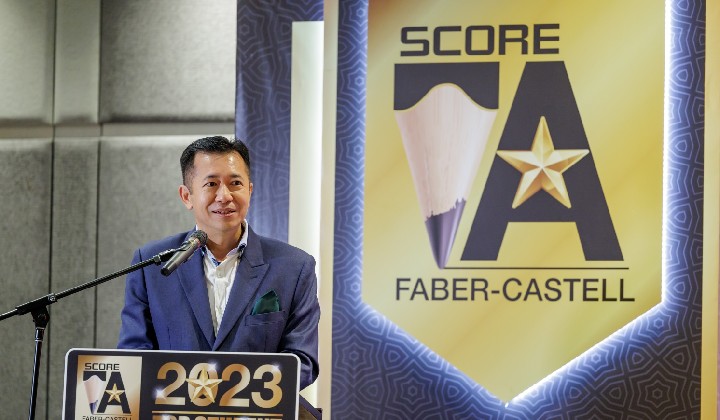Underestimating The Power Of Creativity In Education: A Critical Mistake We Cannot Afford [Opinion]

By: Faber-Castell Malaysia Managing Director Andrew Woon
In today’s ever-evolving world, the education landscape is undergoing a profound transformation. Conventional learning paradigms, where knowledge intake is centred around textbooks, memorisation and standardised tests no longer suffice in preparing students for the challenges of the 21st century.
This demands a fundamental shift to a more contemporary learning approach that prioritises foundational literacies, critical thinking and character development.
Despite creativity’s vital role in stimulating these qualities that will help students thrive, why is it often undervalued and neglected in our classrooms?
As we step into 2024 and look towards further development on the Ministry of Education’s (MoE) 2027 School Curriculum Plan, it is crucial for schools and parents to also delve into the importance of integrating creativity in education and methods to nurture it.
The key role of creativity in shaping future-ready students
With the 2027 School Curriculum Plan aiming to produce well-balanced students, creativity plays a vital role as a catalyst to strengthen character building, thinking skills and lifelong learning, offering a myriad of benefits that extend beyond the classroom.
One pivotal advantage lies in the heightened intrinsic motivation and engagement experience for students. When learning becomes a canvas for creative expression, students are drawn into the educational process, fostering a genuine enthusiasm to acquire knowledge.
Motivation not only amplifies academic achievements but instill a lifelong passion for learning, empowering students to navigate complex situations.
Moreover, the integration of creativity bridges the gap between traditional classroom learning and its real-life applications. As students engage in creative exercises and projects, they gain a better understanding of how theoretical knowledge like numeracy, scientific and civic literacy translates into practical solutions for real-world challenges.
An experiential learning approach also enhances the relevance of academic content when it is applied to everyday scenarios.
At its core, creativity bolsters curiosity, creative thinking, and problem-solving. As students grapple with open-ended tasks, creativity compels students to explore new ideas and perspectives in developing innovative solutions.
This, in turn, shapes students into open-minded, adaptable and resourceful individuals, recognising that there may be different ways to approach and solve a problem.
Elevating classroom learning experience
Creativity needs to be deliberately implemented – and assessed – within the school curriculum, recognising them as ‘must-have skills’ rather than simply ‘nice-to-have.’
At Faber-Castell, we believe that teachers must embrace innovative learning methods and find creative ways to capture students’ attention.
Supported by the Ministry of Education, we introduced the Score A Creative Learning program to equip teachers with practical applications of 10 creative learning techniques, which were cascaded to their students.
An example is Miss Lo Ming Jun, a remarkable physics teacher at SMK Methodist Sibu, who embraced this program. Miss Lo infused creativity into her lessons by incorporating emojis and internet slang. One of her students, Vicky Tiong, found a unique way to blend her love for art with notetaking.
The results were impressive – Vicky experienced a more meaningful learning journey, increased study effectiveness, and improved grades. Beyond academics, Vicky utilised her accomplishments from the Score A program to enhance her college and university applications.
I also had the privilege of witnessing inspiring stories that underscore the impact of creative study skills. One such remarkable tale comes from Nur Qaleesya Soffiya, a student from SK Jalan 3, Bangi, and a returnee at the 2023 Score A program.
She discovered her visual learning style and improved comprehension by infusing colours, animal characters, and mind maps into her note-taking. This creative approach not only made her learning effective but also added an interesting twist to her studies.
Arts as catalysts for learning and creativity
Teaching young students about global issues, such as understanding the environment and climate change, can be challenging. Art provides a creative way to learn, incorporating visuals, emotions, stories and thinking skills.
The Young Artist Award exemplifies this, helping students not only with art but also in grasping environmental issues.
In 2023, students nationwide in Malaysia achieved a milestone by breaking the Malaysia Book of Records with the highest number of submissions, making the 2023 Young Artist Award ‘The Largest Young Artist Colouring Contest’. The top-winning artworks will be showcased at the UTme! by UNIQLO outlets this year, marking our commitment to expanding, sharing, and inspiring young artists.
The interpretations of sustainability-themed artworks by these young minds were inspiring, showcasing their problem-solving and analytical thinking in addressing global challenges.
Raja Ahmad Alauddin, a Young Artist Award finalist who discovered his love for art at the age of four, stands out among them. Coming from a family of creatives, he collaborates with local artists like Ujang, who serves as a constant inspiration in his artistic journey. Aspiring to raise awareness through impactful artwork, Raja Ahmad is an inspiring young illustrator.
Additionally, we should continue to support young Malaysians to consider art not only as an outlet for creativity but also as a potential future career goal.
As an advocate for learning and creativity, Faber-Castell remains dedicated to collaborating closely with the Ministry of Education (MoE) to champion innovative learning initiatives such as the Score A program and Young Artist Award. The 2027 School Curriculum Plan marks a significant stride towards nurturing a generation with a growth mindset, competitiveness, and resilience.
We encourage schools and parents to embrace initiatives that prioritise creativity and essential skills for student success. This approach is beneficial not only for young Malaysians but also for the overall progress and well-being of the country and society. We cannot afford to underestimate the power of creativity in education.
If you’d like to have your opinion shared on TRP, please send it via email at editorial@therakyatpost.com with the title “OPINION:” or through social media on TRP’s Facebook, Twitter, Instagram, or Threads.





